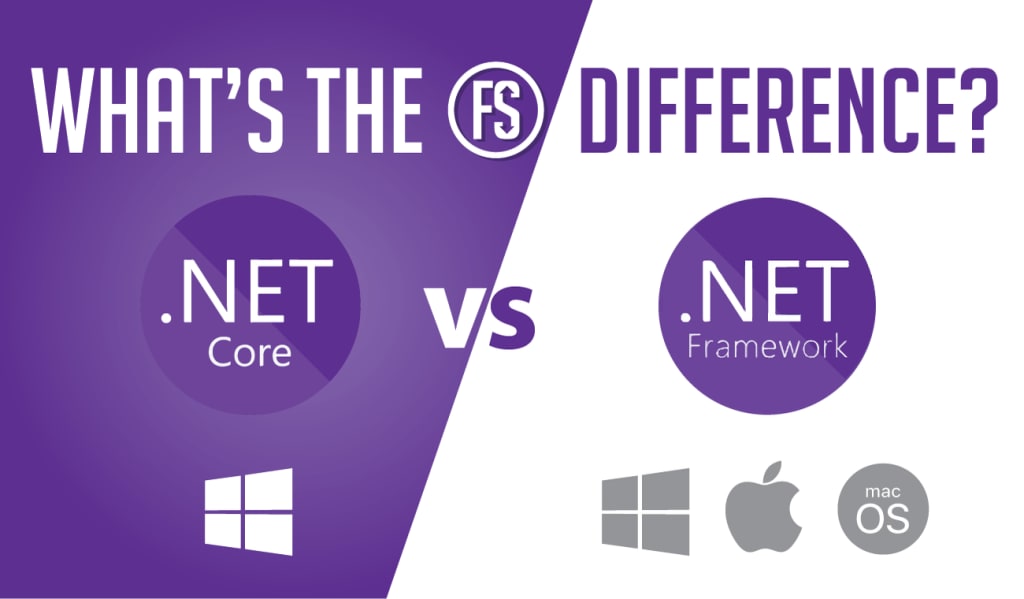.NET Framework and .NET Core
Any main difference?

The main difference between .NET Framework and .NET Core is their architecture and compatibility with different operating systems.
.NET Framework is a traditional software framework that has been around since 2002. It was designed to run on Windows operating systems and relied on a monolithic architecture where all components of the framework were tightly coupled with the operating system. This means that applications built with .NET Framework can only run on Windows machines that have the required version of .NET Framework installed.
On the other hand, .NET Core is a newer and more modular framework that was first introduced in 2016. It was designed to be cross-platform and can run on Windows, Linux, and macOS operating systems. It also uses a more flexible and lightweight architecture, where components can be easily added or removed as needed. This makes .NET Core more suitable for modern cloud-based applications and microservices.
Another key difference is the development process. .NET Framework requires developers to use Visual Studio, a Windows-only Integrated Development Environment (IDE), while .NET Core supports a wider range of development tools and IDEs, including Visual Studio Code, which is a cross-platform IDE.
Overall, while both frameworks share some similarities and are used to build .NET-based applications, .NET Core is generally seen as a more modern and versatile option, especially for building cloud-native applications that need to run across multiple platforms.
Here are some additional differences between .NET Framework and .NET Core:
Runtime: .NET Framework relies on the Common Language Runtime (CLR) to run .NET applications, while .NET Core uses the .NET Runtime (CoreCLR).
Size: .NET Framework is a large and complex framework that includes many components, whereas .NET Core is more modular and allows developers to include only the components that are required for their application. This makes .NET Core applications smaller and more lightweight than .NET Framework applications.
Performance: Because of its monolithic architecture, .NET Framework is not as performant as .NET Core, which uses a more optimized and streamlined architecture. This makes .NET Core better suited for high-performance applications that need to handle large volumes of data and user requests.
Support: .NET Framework is a mature framework that has been around for many years and has a large developer community. As such, it has a wide range of tools and libraries available to developers. However, because .NET Core is a newer framework, it may not have the same level of community support and resources available.
Licensing: .NET Framework is a proprietary framework that is owned by Microsoft and is subject to licensing fees. In contrast, .NET Core is an open-source framework that is available for free under the MIT License.
Compatibility: Because of its monolithic architecture, .NET Framework is not as flexible as .NET Core when it comes to compatibility with different operating systems and platforms. This can make it more challenging to deploy .NET Framework applications in certain environments. In contrast, .NET Core is designed to be cross-platform and can run on a wide range of operating systems and platforms.
Deployment: .NET Framework applications require that the framework is pre-installed on the target machine before the application can run. This can make deployment more challenging, especially when deploying to multiple machines. In contrast, .NET Core applications can be deployed as self-contained applications that include all the required components, making deployment much easier.
Versioning: Because of its monolithic architecture, .NET Framework applications are typically tied to a specific version of the framework. This means that if a newer version of the framework is released, applications built on an older version may not be compatible with it. In contrast, .NET Core applications are designed to be forward-compatible, meaning that they should continue to work even as new versions of the framework are released.
Support for modern technologies: .NET Core has built-in support for modern technologies such as Docker containers, Kubernetes, and microservices, making it easier to build modern cloud-native applications. While it is possible to use .NET Framework with these technologies, it requires more work and may not be as seamless as using .NET Core.
Development agility: Because .NET Core is more modular and flexible, it allows developers to work more efficiently and with greater agility. They can easily add or remove components as needed, which can speed up development and make it easier to iterate on code.
In summary, .NET Framework and .NET Core are both used to build .NET-based applications, but they have different architectures, compatibilities, and features. While .NET Framework is a mature framework that has been around for many years, .NET Core is a newer, more lightweight framework that is better suited for modern cloud-based applications.
-AR
About the Creator
Abdul Razack
Writing has been my passion. Fiction, poetry, and fanfiction are my favorite forms of storytelling. Writing movie reviews is something I enjoy doing.
Feel free to subscribe, leave a comment, and spread the love






Comments
There are no comments for this story
Be the first to respond and start the conversation.